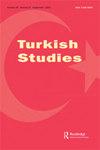当代土耳其的正义与发展党、宗教和政治价值观:对未来民主的影响
IF 1.7
3区 社会学
Q1 AREA STUDIES
引用次数: 2
摘要
正义与发展党(AKP)于2002年上台执政,承诺进行改革以进一步巩固土耳其的民主。当时,正义与发展党代表了一个彩虹联盟,由以前的伊斯兰政党和许多受够了旧世俗政党失败的自由民主人士组成。土耳其公众和他们一样感到沮丧,并以压倒性多数支持正义与发展党。不幸的是,这些改革并没有持续下去。今天,无可争议的是,在正义与发展党,更具体地说,是总统雷杰普·t·Erdoğan的统治下,土耳其已经成为一个由一个人定义和塑造的威权国家。这篇文章探讨了这些发展对土耳其民主的未来意味着什么,因为这个国家正在庆祝其百年诞辰,它包括对土耳其政治文化是否支持这些变化的检验。本文章由计算机程序翻译,如有差异,请以英文原文为准。
The AKP, religion, and political values in contemporary Turkey: implications for the future of democracy
ABSTRACT The Justice and Development Party (AKP) came to power in 2002 with the promise of reforms to further democratic consolidation in Turkey. At that time, the AKP represented a rainbow coalition of individuals from the previous Islamist parties and many liberal democrats who were fed up with the failures of old secular political parties. The Turkish public shared their frustrations and overwhelmingly supported the AKP. Unfortunately, these reforms did not last. Today, it is indisputable that under the rule of the AKP, and more specifically, President Recep T. Erdoğan, Turkey has become an authoritarian state defined and shaped by one person. This article explores what these developments mean for the future of Turkish democracy as the country celebrates its centenary, and it includes an examination of whether Turkish political culture is supportive of such changes.
求助全文
通过发布文献求助,成功后即可免费获取论文全文。
去求助
来源期刊

Turkish Studies
AREA STUDIES-
CiteScore
2.80
自引率
7.70%
发文量
44
期刊介绍:
Turkey is a country whose importance is rapidly growing in international affairs. A rapidly developing democratic state with a strong economy, complex society, active party system, and powerful armed forces, Turkey is playing an increasingly critical role in Europe, the Middle East, and the Caucasus. Given Turkey"s significance and the great interest in studying its history, politics, and foreign policy, Turkish Studies presents a forum for scholarly discussion on these topics and more.
 求助内容:
求助内容: 应助结果提醒方式:
应助结果提醒方式:


